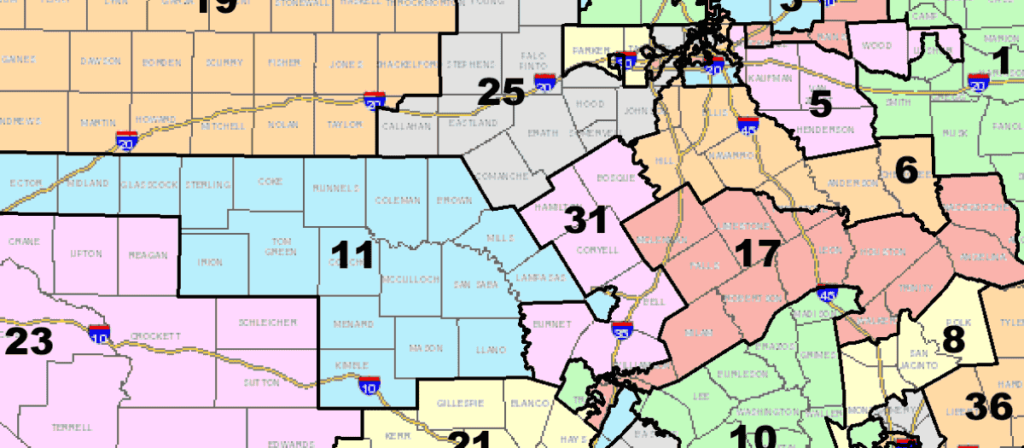In the heat of nationwide redistricting battles, the Supreme Court heard oral arguments for Louisiana v. Callais, a case challenging Louisiana’s congressional map that created a second black-majority district. The final ruling could have significant implications for the fight for the House of Representatives, particularly in the redistricting battles happening in the states.
The current district maps are based on the 2020 census; however, President Trump has called for a new census that explicitly excludes illegal immigrants. Since the 2020 election, more than half of the state maps have been challenged in court.
While Republicans hold a historically slim 219-213 majority in the House of Representatives, it would only take a three-seat flip to lose their control. As the 2026 election looms around the corner, both Republicans and Democrats have taken a closer look at every state’s district maps.
This past summer, Texas lawmakers approved a new congressional map that would add up to five new seats to their Republican delegation. California then redrew its maps in a way that increased its Democratic representation by five seats. Before we knew it, a gerrymandering war ensued nationwide.
Several more states have tried to take a bite of the apple; Missouri called a special session to reevaluate its maps, House Minority Leader Hakeem Jeffries (D-New York 8th) called on Illinois to redistrict, Utah is considering a map-related ballot measure, North Carolina and Virginia have both gotten in the game, and rumors say Maryland could be next. Vice President JD Vance has also made several appearances in the Hoosier state in the heat of their redistricting standoff.
Several of the Democrat’s redistricting arrows are pointed at the U.S. House’s most conservative leaders. Members at risk under new maps include:
Congresswoman Mary Miller (R-Illinois 15th)
Congresswoman Miller is one of only three Republican members in the Illinois delegation, representing the western part of the state. She is the founder and chair of the House Family Caucus and sponsors several CWA Legislative Action Committee (CWALAC) endorsed pieces of legislation, including the Ultrasounds Saves Lives Act, the Second Chance for Moms Act, the Parental Rights Amendment, the Safety and Opportunity for Girls Act, and more. She is also a member of the House Pro-Life Caucus and the Values Action Team.
Congressman Andy Harris (R-Maryland 1st)
As the only Republican representative from the state of Maryland, Congressman Harris is a target for the Democrat Party. Congressman Harris is the Chairman of the House Freedom Caucus (HFC), which is known as one of the most conservative caucuses in Congress. During any negotiation, Democrats often find themselves pitted against the unwavering government-limiting demands of the HFC.
Congressman Doug LaMalfa (R-California 1st)
California’s new district maps could change California’s first district entirely. Congressman LaMalfa has represented the district in Congress for over a decade, but his seat now swings in the balance as the makeup would likely flip towards Democrat control. Congressman LaMalfa has been a fierce advocate for women and children and cosponsors several CWALAC endorsed pieces of legislation including Pregnancy.gov and the Protection of Women in Olympic and Amateur Sports Act.
But these battles are not confined to state-level debates. Another at-risk Republican introduced federal legislation that would prevent any state from redistricting mid-decade, despite the President’s current support for a renewed census that excludes illegal immigrants.
Additionally, the U.S. Supreme Court is reexamining districting precedent in Louisiana v. Callais. The case challenges a Louisiana district map drawn to prioritize race-based representation. This appeal came from the prior ruling that the map was racially gerrymandered; the Court must now evaluate if, or to what extent, race can play a role in districting. A report from the Black Voters Matter Fund claims a ruling against race-based mapping “could help secure an additional 27 safe Republican U.S. House seats.”
It’s unclear whether the Court’s decision could go into effect before the 2026 election, but it is not out of the question. Additionally, uncertainty about the district maps extends beyond just the court case; it is something through which nearly every state is working. As Concerned Women for America LAC tracks these changes, we encourage all states, voters, and legislators to prioritize the equal and fair representation of every American citizen. It is critical to fair representation, a core of Americanism, that maps do not discriminate based on political party, sex, socioeconomic status, or race.






